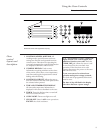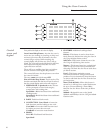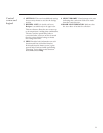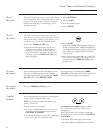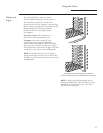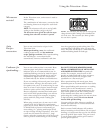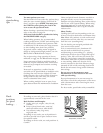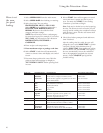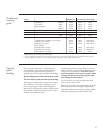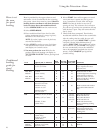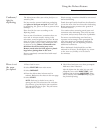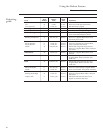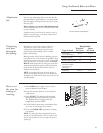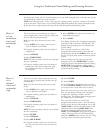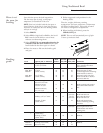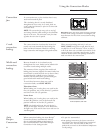
Traditional
roasting
guide
17
Tips for
speed
broiling
Your oven with Trivection
™
technology has
the flexibility to broil like a traditional oven
or speed broil. Speed broiling of meats is
approximately twice as fast as traditional broiling.
Speed broiling must be done with the door closed.
The oven must be preheated when speed broiling.
Turning meat and poultry is optional in speed
broil. However, use tongs if turning meat to
prevent piercing the meat and losing juices.
Speed broil will generally produce good results
for medium to well done meats. If rare meat is
desired, use traditional broil.
Cooking times will vary depending on the cut
of meat. Check for doneness at minimum time
using a meat thermometer. DO NOT leave a
meat thermometer in the meat or poultry while
cooking with Trivection technology since this
may damage the thermometer.
Use the broiler pan with grid provided with
your oven for best results.
Evenly slit fat around the outside edges of steaks
and chops to prevent curling during broiling.
If desired, marinate meats before broiling. Brush
with sauces during the last five minutes only.
Meats Minutes/Lb. Oven Temp. Internal Temp.
Beef Rib, Boneless Rib, Rare
†
22–26 325°F 140°F
†
Top Sirloin Medium 26–30 325°F 160°F
(3 to 5 lbs.) Well 30–34 325°F 170°F
Beef Tenderloin Rare
†
12–16 325°F 140°F
†
Medium 16–20 325°F 160°F
Pork Bone-in, Boneless (3 to 5 lbs.) 30–35 325°F 160°F
Ham Canned, Butt, Shank (3 to 5 lbs., fully cooked) 23–28 325°F 140°F
Lamb Bone-in, Boneless (3 to 5 lbs.) Medium 25–30 325°F 160°F
Well 30–35 325°F 170°F
Poultry Whole Chicken (2-1/2 to 3-1/2 lbs.) 24–26 325°F 180°–185°F
Cornish Hens, Unstuffed (1 to 1-1/2 lbs.) 40–45 325°F 180°–185°F
Stuffed (1 to 1-1/2 lbs.) 45–50 325°F 180°–185°F
Duckling (4 to 5 lbs.) 28–32 350°F 180°–185°F
Turkey, whole*
Unstuffed (10 to 16 lbs.) 14–18 325°F 180°–185°F
Unstuffed (18 to 24 lbs.) 8–12 325°F 180°–185°F
Turkey Breast (4 to 6 lbs.) 23–27 325°F 170°F
* Stuffed birds are not recommended for speedcooking.
† The U.S. Department of Agriculture says “Rare beef is popular, but you should know that cooking it to only 140°F means some food
poisoning organisms may survive.” (Source: Safe Food Book. Your Kitchen Guide. USDA Rev. June 1985.)



